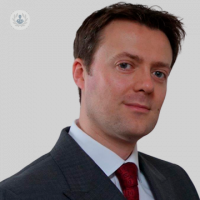Knee replacement: An expert’s guide
Written by:Knee replacement is a very common surgical procedure that replaces a damaged knee joint, commonly affected by arthritis, with a new artificial joint.
Here, Mr Simon Pearce, renowned consultant orthopaedic surgeon, provides an expert insight into knee replacement surgery, including preparation, surgery, and recovery.

What are the indications for knee replacement surgery?
Knee replacement is a safe and effective surgical procedure that can relieve joint pain and stiffness, correct alignment issues and increase range of motion, helping patients with knee problems to resume their daily activities.
Of these, the most common reason for having knee replacement surgery is severe pain in the knee as a result of joint damage from wear-and-tear arthritis (commonly osteoarthritis).
Which type of replacement would benefit me more: a total or a partial knee replacement?
A total and a partial knee replacement both replace the damaged parts of the knee joint with artificial components called implants (prosthesis) made of metal, ceramic, or medical-grade plastic.
In a total knee replacement:
- All of the knee joint is replaced, from the lower end of the thigh bone to the upper end of the shin bone
- Sometimes, the back of the kneecap is replaced as well
In a partial knee replacement:
- Patients who have arthritis in only one half of the knee are generally considered suitable candidates
- Only the bones on the side of the knee affected by arthritis are replaced
Ultimately, the decision between a total and a partial knee replacement will depend on various factors, including the patient’s age, the specific damage to their knee joint, and their overall physical condition.
How can I prepare for surgery? Should I consider physiotherapy or weight loss, for example?
Before having knee replacement surgery, patients will discuss with their orthopaedic surgeon the things that they can do to prepare for surgery.
This might include:
- Eating a healthy and balanced diet.
- Managing weight or losing weight.
- Doing pre-surgical physiotherapy exercises to strengthen the muscle that surrounds the knee.
- Stopping from taking certain medications.
- Stopping smoking and stopping alcohol intake.
Most patients are recommended to attend a pre-admission clinic to ensure that they’re in a good physical and mental condition to go ahead with the procedure.
In addition, some patients may also wish to make arrangements for when they get home after surgery, such as asking for help to carry out day-to-day activities.
How is knee replacement surgery performed, and how long does it take?
During knee replacement surgery, the orthopaedic surgeon will make a cut down the front of the knee and will move the kneecap aside to access the knee joint behind it. The damaged parts of the knee joint will then be cut away and the implants will be fitted over the end of the bones to create a new, artificial knee joint. The surgeon will later close the cut in the knee and cover it with a bandage.
The operation typically takes approximately one hour, but the preparation and recovery time will vary depending on each patient.
What are the different implant options available?
There are many different types of knee implants used in knee replacement surgery. The most common one is a metal on plastic.
The final choice of knee implant will depend on various factors, including:
- The knee’s ligaments, muscles, and bones
- The patient’s age, weight, allergies, and physical activity
- The orthopaedic surgeon’s experience and familiarity with the implant
- The implant’s cost and performance
After surgery, how soon will I be able to walk? Is there anything that I should avoid?
Most patients are able to walk with mobility aids on the day or two after surgery, followed by crutches within a few weeks. It’s important, however, to avoid overstraining the knee by walking too much or too quickly because this can cause swelling and more pain.
Within four to six weeks after surgery, most patients will be able to walk without crutches or any other assistive devices.
Patients will be fully recovered from their knee replacement after a year.
Mr Simon Pearce is a leading consultant orthopaedic surgeon with over 20 years’ experience.
If you require or are considering knee replacement surgery, don’t hesitate to book an appointment with Mr Pearce via his Top Doctors profile today.


